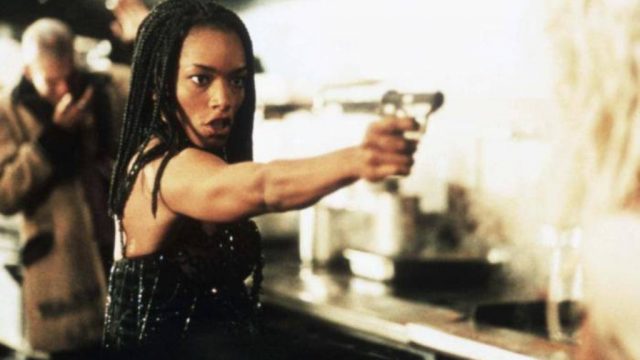It’s a pity Kathryn Bigelow only started winning major awards when she switched genres to ‘war movie,’ because genre has never limited her talents, and her pulp is far more fun. Near Dark is assured, hypnotic and influential; Point Break spawned a thousand memes and a hilariously memorable reference in Hot Fuzz.
Strange Days, 1995’s venture into sci-fi (with an edge of film noir), was a flop in theaters but still well worth a watch; its greatest miscalculation is one sadly typical of action movies, putting the dullest character (a cop turned black marketeer played by Ralph Fiennes) at the center. Fiennes does a fine job as a morally compromised cynic hung up on a lost love (Juliette Lewis), but he’s just not as compelling his co-stars. Neither Lewis nor Fiennes, of course, are half as interesting as Angela Bassett’s Mace, a live-wire bodyguard with a near-inexplicable torch for Fiennes, but it was 1995, and we can only expect so much.
But let’s take a moment to talk about Mace, anyway, because she’s the first thing most people remember about this movie–with damn good reason. Bassett is sharp as nails in this role, dangerous, sexy and dangerously sexy, and (despite her weakness for Fiennes’ character) undeniably her own person with her own past, agenda and motivations. If the movie had had more of her, it might have done better in theaters, or at least had a longer life on home video. (For years, this performance made her a popular fancast for the X-Men’s Storm, and a lot of people–including me–still mourn the lost opportunity.)
Strange Days is ambitious, building a complete and compelling future LA quickly and effectively. Its ‘fifteen minutes into the future’ premise takes inspiration from the Rodney King riots, the promise of virtual reality, and a future where every crime is recorded and played back. Some of this is prescient, and feels as fresh as it did in the late nineties. But for a film noir, it’s a bit too optimistic, and its suggestion that when the public becomes aware of police brutality things change seems bitterly naive in a nation that’s seen–and turned away from–far worse than Rodney King. It’s not as compelling or focused as Point Break or The Hurt Locker, and its central MacGuffin–a ‘SQUID’ recording, which records and reproduces the visual and physical sensation of a young woman’s rape and murder–is too serious to work effectively as a plot engine. Still, the strange world of Strange Days is well worth a visit. You won’t forget it–or Mace–any time soon.

